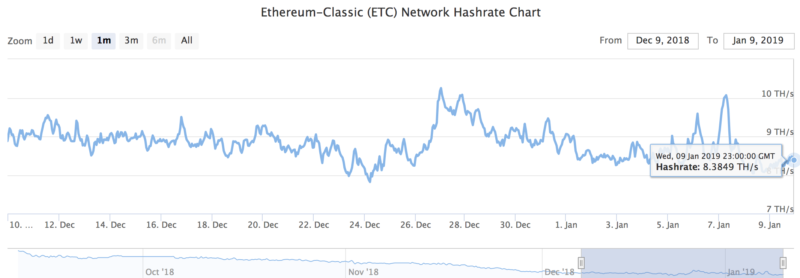Quick Take
- Despite consensus among Core Devs, the ProgPow proposal, which aims to reinstate ASIC-resistance, has faced pushback from the wider Ethereum community
- Concerns revolve around security, free market ideals, and the possibility of an avoidable chain split
- Irrespective of the ultimate outcome, the ProgPow debate will provide significant insight into Ethereum’s informal governance process
Last week’s Ethereum Core Dev Call concluded with renewed discussion of ProgPow, a proposed change to the Ethereum hashing algorithm, Ethash, which would narrow the performance gap between generalized and specialized hardware by as much as 90%.
The rationale behind the algorithm adjustment speaks to Ethereum’s egalitarian ethos: the improved efficiency of specialized versus generalized hardware provides material advantages to ASIC owners, destroying any notion of Satoshi’s ‘one CPU one vote’ and concentrating hashpower in the hands of those who can leverage economies of scale to afford more expensive machines.
Ethash, with its memory-intensive requirements, was explicitly designed to be ASIC-resistant, as pioneering community members and developers expressed fears of Bitmain’s dominance across Bitcoin’s mining landscape. And yet, the emergence of Bitmain’s Antminer E3 made it clear that even Ethash was ultimately susceptible to specialization.
After some back and forth between Alexey Akhunov and ProgPow architect Kristy-Leigh Minehan, Ethereum Foundation’s Hudson Jameson noted consensus amongst the call’s participants, asserting that ProgPow should move ahead in the coming months barring the discovery of any major bugs during the test phase. Ethereum 2.0 client developers suggested that the adjustment could be integrated within 2-3 weeks, while the upgrade would go live in the next nine months.
However, despite ostensible agreement amongst Core Dev members, several notable figures within the wider Ethereum community have pushed back against the proposal, offering convincing rebuttals as to why ProgPow should not be pursued.
Security
Perhaps the most pertinent argument against ProgPow comes in the form of the attack mounted against the Ethereum Classic network earlier this week. With just 4.42% of Ethereum’s hashpower, estimates place the cost of a 51% attack on Ethereum Classic at less than $5,000 per hour.


Source: Coinwarz.com
While it remains difficult to accurately assess the percentage of existing Ethereum hashpower contributed by ASICs and simultaneously unlikely that the implementation of ProgPow would result in a 96% decline of network hashpower, ceteris paribus, the removal of ASICs will see a significant decline in the cost required to attack the Ethereum network, thereby opening up the network to a debilitating attack.
Beyond the reduction of absolute network hashpower, it is also worth considering that a GPU-dominated mining landscape impacts the incentives of would-be attackers. The general purpose nature of GPUs means that they can be easily offloaded after a 51% attack or pointed towards competing chains: conversely, any Ethash-based ASIC owner would only have the option to switch to Ethereum Classic, which is unlikely to provide the necessary economic rewards to make up for lost mining revenue on the currently profitable Ethereum chain. As a result, somewhat paradoxically, the vast capital expenditure and inflexibility associated with specialized hardware might actually disincentivize the launch of an attack, therefore mitigating the risk of centralization associated with ASICs.
Further, despite noble efforts to even the playing field for all miners, we must ultimately accept that over the medium-long term pure ASIC-resistance is a fallacy: at some point it becomes profitable to manufacture specialized hardware even if the ASIC does not provide exponential efficiency advantages over GPUs. In this context, the introduction of ProgPow is but a short-term and unsustainable strategy.
Free Market
As a ‘decentralized’ network, there is no single manifesto to which Ethereum community members subscribe, but the permissionless nature of the project suggests that participants have some non-trivial respect for free markets.
While many will be sympathetic to ProgPow’s attempt to take power out of large mining manufactures and return to Ethereum’s egalitarian roots, it is hard to avoid the anti-competitive nature of the upgrade, which stands to repudiate the innovative attitude of the Ethereum ecosystem.
It is hard to avoid drawing parallels between the ProgPow proposal and Sia’s decision to hard fork their hashing algorithm in order to render Bitmain and Innosilicon-produced ASICs useless while pushing their own Obelisk hardware.
As with the Sia scenario, ProgPow will have winners and losers, the latter being hardware manufacturers who legitimately invested significant research and development resources into producing specialized hardware. Meanwhile, the nature of ProgPow favours dominant incumbent GPU manufacturers, Nvidia and AMD, both of whom are the leading suppliers of GPUs and best positioned to develop ProgPow-ASICs of their own. Ironically, the implementation of ProgPow may merely transfer oligopolistic power away from Bitmain and Innosilicon to Nvidia and AMD.
Community Disruption
Without wishing to sensationalize, the contentious nature of ProgPow threatens to exacerbate tensions within the Ethereum community, encouraging a split akin to that witnessed after the DAO debacle of 2016.
While Ethereum has long shirked the kind of conservatism associated with Bitcoin, the overwhelming sentiment among community members today is one supportive of changes to the core protocol only when faced with existential crises or material improvements that will help attain the final, steady, Serenity state.
The reversal of the DAO hack in 2016 was a prime example of an upgrade that met the former condition, while the impending transition to Proof of Stake clearly satisfies the latter. By contrast, EIP-999, which proposes to reverse the Parity Multi-Sig snafu, has no immediate obvious advantages besides reimbursing various individuals, and thus the Core Devs have wisely refrained from unlocking funds.
It is difficult to justify the empirically unquantifiable gains to ‘decentralization’ that may come from ProgPow when you take into account the risk of a community-led split. We must contemplate the confusion that would occur in a scenario whereby ProgPow is integrated but only a small percentage of nodes upgrade their clients and the majority of hashpower stays with the Ethash chain. In that sequence of events, which of the two chains would the community, and the markets, consider to be the ‘legitimate’ Ethereum?
Considering there is an absence of evidence that Ethereum is currently threatened by the centralization of miners, the safest option is to simply stick with the status quo and proceed along the well-defined roadmap towards Serenity. Proponents of ProgPow argue that transitioning away from ASICs will actually reduce the chances of future contention around Proof of Stake as ASIC manufacturers, incentivized by their significant sunk costs, spread fear, uncertainty, and doubt around the impending metamorphosis. However, that Proof of Stake has been on the Ethereum roadmap since 2014 and has become a defining feature of the network suggests that it should be entirely uncontroversial.
Looking Forward
Irrespective of the outcome on ‘Proposition ProgPow’, the following weeks will provide invaluable insight into Ethereum’s governance process. Unlike the on-chain governance systems favoured by the likes of EOS, Tezos, and Decred, the Ethereum decision making process relies on soft-power and rough, informal consensus among various participants. While members of the Core Dev Team are trusted to proceed with technical decisions the broad community expects their views to be taken into account on more philosophical and economic oriented issues like ProgPow.
Now that various community members have expressed their concerns, despite consensus amongst Core Devs, we should hope that the implementation of ProgPow will be delayed pending further debate, research into the effects on security, and broad approval.
If ProgPow proceeds as planned then we must expect various community members to feel disenfranchised in what will arguably be the most contentious upgrade since The DAO. As such, the implications of ProgPow extend far further than miner concentration: they provide a glimpse into the future of Ethereum decision making, the voices and views that will be respected and abided, and the stakeholders that will consequently be disregarded.
Bagikan Berita Ini














0 Response to "Despite Core Dev consensus 'Proposition ProgPow' faces community concerns - The Block Crypto"
Post a Comment